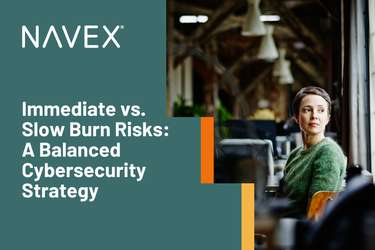It seems that nowadays you can’t open an internet browser without seeing multiple stories about Artificial Intelligence (AI). AI dominates discussions and headlines. While AI has existed for many years, the advent of large language models and generative AI such as ChatGPT and subsequent integrations with popular websites and applications truly changed the game.
Between the widespread application of AI, lack of regulatory oversight, and governance policies still being in their infancy, to say artificial intelligence is fraught is an understatement. However, there are many applications where AI language modeling can be revolutionary – and more importantly, secure – creating a nuanced use case that is not making as many headlines.
So, let’s talk about how organizations can use AI in a closed environment to enhance efficiency and streamline processes while maintaining confidentiality.
Unpacking large language models
Artificial intelligence is really an umbrella term for a versatile technology that can do a seemingly endless number of tasks and activities. A non-exhaustive list of examples includes automating repeatable processes, predicting outcomes based on data, and of course, large language models to create written content.
Large language models, or LLMs, is AI that mimics human intelligence in creating written content by analyzing, rearranging and then “creating” content. While some applications of LLMs are clearly fraught due to concerns about plagiarism or inaccurate information, they can, when well-governed, properly deployed, and with sound source data, transform how your business does business. The secret is to create a closed environment where the source material used for providing answers or generating text is known, vetted and trusted.
Closed system versus public AI tools
One of the issues I see often is that the term “AI” is a catch all for the technology, missing all the nuances of how it can be used safely in a controlled and private environment.
A common misconception is if an LLM tool is used that you’re exposing that information to the entire internet. While yes, this is a concern with using public tools such as ChatGPT to write or analyze content based on confidential information, such company finances or the like, using a closed system AI tool to digest data alleviates that concern. For example, when using a closed system, the AI algorithm is used only on data within the company’s internal systems, meaning that information never leaves the firewall. You can still use the power of LLMs to analyze data and generate text, but the source material used is yours and is kept confidential and secure.
At NAVEX, one of the ways we use the power of AI is in the form of machine translation capabilities within a closed system. We are launching this technology for our Conflict of Interest Disclosures this month, and our Third-Party Due Diligence solution is coming soon, which allows users to input their information into a secure environment. Using AI, that disclosure can be privately translated into 75+ languages, without the risk of copying and pasting confidential and sensitive information to a public internet site, or the cost and delay of waiting for a professional translator.
Why machine translation matters
You may be asking yourself, “why do I need machine translation?”. To us, the answer is simple: by allowing employees to disclose potential COIs on their terms and in their language, you’re more likely to get accurate and complete information. And by leveraging machine translations, the program administrator is able to digest that information more efficiently in whichever language is needed for the administrative portion of managing a COI. Further, instant translations allow program administrators to quickly understand if a COI disclosure is urgent and needs follow-up immediately, versus waiting for a translation to arrive to evaluate the content.
But wait, there’s more! Earlier, I mentioned that pasting confidential information into a LLM exposes the information to the public internet. Clearly with sensitive information such as a conflict of interest disclosure, that would be negligent and problematic. But with a closed system, using an integrated AI tool within your software, that circumvents the risky part of using AI for translations.
Finding balance with AI
When it comes to AI, there are a multitude of (often very strong) opinions. Some informed and balanced, some catastrophic and with a “robots will rule the world” commentary.
In the end, it really comes down to how it is being used and governed. Understanding the distinction between a closed system versus one that is open to the public is a great first step. It is also critical to consider how AI is being used, and to put in place governance systems to manage that use. When used properly, AI enhances productivity and improves operational efficiency by better handling repeatable tasks; it doesn’t take away human jobs.
As a company focused both on sustainable, scalable ethics and compliance solutions and innovation, NAVEX is excited to find more ways to implement AI in a secure manner to better leverage this revolutionary technology.
To learn more about the newly released machine translation feature found in the NAVEX One platform, check out our press release.
For more information about how NAVEX can help your organization manage conflicts of interest:
Frequently Asked Questions (FAQ)
What are large language models (LLMs) in AI, and how do they work within a closed system?
LLMs are AI systems that mimic human intelligence in generating written content by analyzing, rearranging and creating text. In a closed system, LLMs operate within an organization's internal environment, using known, vetted and confidential source data.
2. What distinguishes a "closed system" from public AI tools in terms of data security?
A "closed system" implies that AI algorithms exclusively process data within the organization's internal systems, ensuring data never leaves the security firewall. This stands in contrast to public AI tools that can expose sensitive information to the public internet.
3. How does machine translation within a closed system benefit organizations in managing conflicts of interest (COIs)?
Machine translation in a closed system offers several advantages, including the ability to privately translate COI disclosures into multiple languages. This process enhances accuracy and efficiency, allows for swift assessment of the urgency of disclosures and prevents the exposure of sensitive information to the public internet.
4. Why is AI considered a valuable tool for enhancing productivity while maintaining security in a closed system?
AI, when used in a well-governed and confidential manner, can streamline processes, automate repetitive tasks and improve operational efficiency. It ensures the secure handling of data and complements human tasks, contributing to enhanced productivity.
5. How can organizations implement governance systems to manage AI effectively in closed systems?
Implementing effective governance systems for AI involves setting clear policies, ensuring data integrity, and regularly monitoring and auditing AI processes. It also entails establishing protocols for data privacy, security and compliance within the closed system.
6. What role does NAVEX play in using AI for secure and compliant solutions?
NAVEX is dedicated to leveraging AI for sustainable, scalable ethics and compliance solutions. By implementing AI securely, NAVEX helps organizations harness this technology to enhance efficiency while ensuring data security and compliance.







